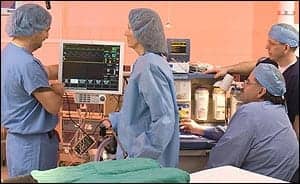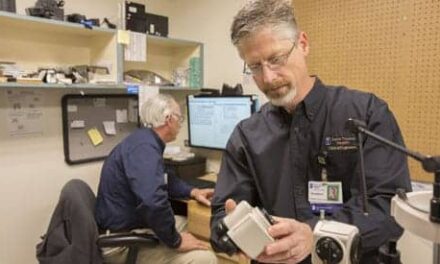Most people don’t equate “family” with “work,” but the TriMedX clinical engineering team at Michigan’s Ascension Borgess Health doesn’t fit into most categories. Below, Angela Ferguson-Bennett, Ascension Borgess Health’s clinical engineering director, shares how her team embraces a family-first mentality and has evolved from a “basement-dweller” reputation to Ascension Borgess’ go-to department. Don’t miss out.
24×7 Magazine: Can you please tell us a little bit about your team and what sets it apart from other HTM departments?
Angela Ferguson-Bennett: I would describe my team as more of a family. We laugh, we cry, we fail, and we succeed together much like a family does. Like any family, we also have our differences—but, at the end of the day, we come together to serve our customers and make sure our patients are safe. We are tight-knit group, who lives the Ascension Borgess mission of caring for the poor and vulnerable.
My team services the Southwest region of Michigan and supports the Ascension Borgess Health System, the newly acquired Ascension Allegan General Hospital System, along with the Ascension Medical groups and Borgess Promed groups. This encompasses five hospitals and 80-plus clinics, ranging as far north as Delton, Mich.; to as far south as Sturgis, Mich.; to as far west as Dowagiac, Mich.; to as far east as Marshall, Mich.
Moreover, my team is part of the only Ascension Health Ministry in Southwest Michigan. Anything Ascension Borgess is involved in, my team is involved in, which includes the Borgess Marathon and the Borgess Golf Fundraiser. We have also, in the past, worked with our Medxcel facilities team to put together ‘weekend lunches’ for schoolchildren whose parents can’t afford to provide them with meals over the weekends. We also have ongoing ‘make-a-difference’ days, where my team gets involved in community work—whether it’s volunteering at county fairs that the hospital is involved in or adopting a highway.
Plus, TriMedX has a foundation that we take part in as often as possible, in which some of my techs go to Third World countries—including Dominican Republic, Haiti, Bolivia, etc.— and service medical equipment.
Finally, during AAMI’s annual HTM Week, which takes place in mid-May, we serve ice cream to the hospital staff to show them our appreciation, along with hosting a chili cook-off, where each staff member makes his or her own version of the “perfect dish”—with hospital staff members judging the chilis. [These events show how] we take pride in being involved in our hospital’s growth and success.
24×7: How has your department evolved over the past few years and how do you expect it to evolve even more in the future?
Ferguson-Bennett: My department has evolved quite a bit over the past few years. Previously, we were the obligatory “biomed department,” which lived in the basement and came and went [anonymously]. Now, we make it a point to engage with our hospital staff and let them know that we are here to support them. They know that they can call us with any questions and can count on us to address their equipment needs.
Our hospital is an older hospital, and our equipment is no different. In the past three years, the equipment and technology has evolved in a way that when we get new “toys,” everyone knows about it. Having the ability to replace aging equipment and offer competitive services is a blessing—and seeing new equipment come through the doors motivates clinicians. My team has become very involved in hospital processes and helping hospital staff members become more efficient when using the equipment.
If any equipment training is needed, we can provide it [so that clinicians can focus on patient care]. The only way we can all succeed is by sharing information and educating hospital staff members about the new technology we acquire. We went from being the “biomed shop” to a team that the clinicians come to when they need equipment help.
Also, the new inventory management system that TriMedX uses has made it easier and faster for our technicians to keep our equipment up and running. Specificially, clinicians can log into the customer portal and input work orders, they can see statuses of their equipment in repair, and they can pull service histories. After all, when hospital clinicians feel empowered, they are more willing to help themselves. Giving them the opportunity to have some control makes a huge difference.
In the future, as technology continues to evolve, I see biomed and IT working closer together as every medical device will be on the hospital network and able to connect to the EMR. This will streamline patient care and shorten hospital visits because the brilliant technology will help speed up the healing process. Think about it: We went from having to cut open a knee to replace tissue to performing microscopic surgeries with robots. Anything is possible in the always-changing medical field.
24×7: What would your HTM team say are the top challenges they face on a daily basis?
Ferguson-Bennett: My HTM team would probably say that their top challenge is not having enough time to get everything done. With our ever-growing equipment inventory comes more repairs and preventative maintenance procedures. Some days—and months—are easier than others, but my team works together really well and helps each other get through the busy times. They will alter their schedules to accommodate the hospital’s needs.
If the OR is running back-to-back cases all day, for instance, my techs will either come in early in the morning to get their PMs completed before the cases start or they will work with the staff and schedule their work during the department’s down periods. After all, communication and time management are key when working in high-risk and mission-critical areas.
My team works really well with our hospital staff when it comes to providing service and maintaining their equipment. There is a mutual understanding between the hospital staff and my team; they understand that they cannot be successful without their medical equipment, and we understand that what we do affects the care that they provide. It’s a give-and-take relationship—and it works.
24×7: Can you please discuss a time when your team “saved the day” for another department?
Ferguson-Bennett: Every day we have a win—whether big or small, our team leaves work knowing that they made a difference. For me to say that we “save the day” for another department wouldn’t be fair because, in reality, we all work together to support the hospital and have the same purpose in patient care. For example, if a piece of equipment is down and I know that I need help from another department (such as facilities or IT), I can immediately reach out to them and they will assist me until the issue is resolved.
On the flip side, if another department has an issue involving medical equipment, they can reach out to us and we will help them come up with the best and safest resolution for the patient, as well as for the equipment. That doesn’t even begin to describe the amazing working relationship we have with our counterparts in other departments. It’s the kind of relationship that we take pride in, in our house.
24×7: Is there anything else you would like to share about your team and what sets them apart from others with 24×7 Magazine’s readers?
Ferguson-Bennett: My team is the reason I come to work every day. I know that no matter what kind of day is ahead of me—whether it’s a day full of meetings or a day filled with paperwork—I can count on my team to do the right thing. I can leave work knowing that our home away from home is taken care of and that they will get the job done.
I am very proud of my team and couldn’t ask for a better one. Each member of the team has something unique about him or her, which makes our quirky family dynamic work. Together we live the TriMedX values of innovation, making a difference, and excellence. Together we not only unlock the full potential of our hospital’s clinical assets, but of each other as well.






